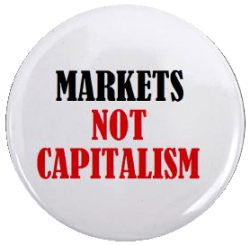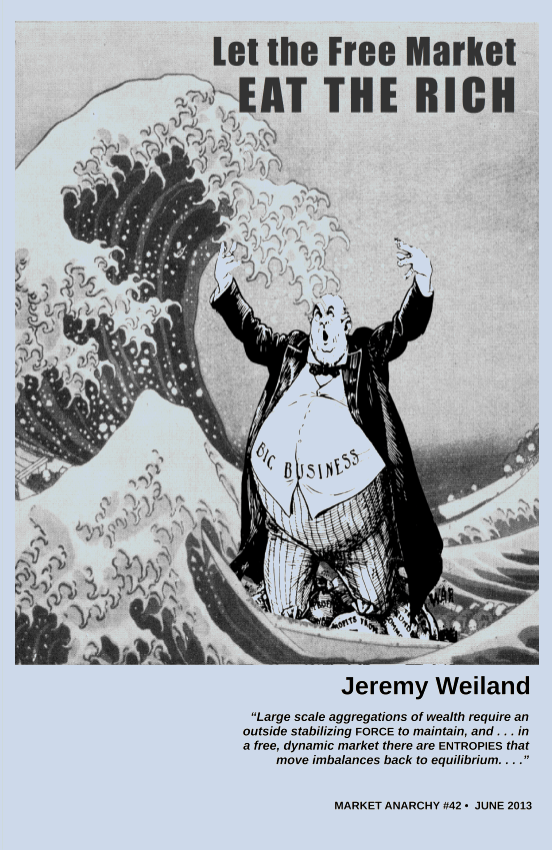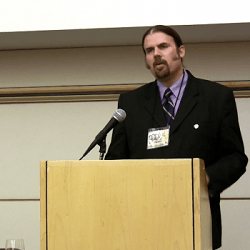
To most people, the left and right of the political spectrum are polar opposites, which cannot be linked together due to ideological beliefs that are incompatible. On the surface, this seems to be the case, as political divisions are divergent as ever, especially in the United States. However, unbeknownst to many, including myself until just recently, there is a small faction of people who have attempted to synthesize together, both the right’s idea of free markets and the left’s idea of giving labor their full value, into an all-encompassing belief system that some refer to as Free Market Anti-Capitalism, Left Libertarianism, or Mutualism.
To comprehend the logic behind the term Free Market Anti-Capitalism, we must first begin to understand the historical context, as well as the current use of the word capitalism and socialism. The goal behind this is to allow people on both the left and right to see and appreciate how different ideologies view the term, rather than just being stubborn and only recognizing your own. We won’t solve anything and move forward until we can at least see how the other side defines such key words.
Related Reading: https://steemit.com/anarchy/@timthevagabond/bridging-the-gap-between-anti-capitalism-and-anti-statism-by-dissecting-the-buzzwords-that-divide-us
Next we must understand what a true free market really embodies, not the quasi-free market many mistake for a free market. Real free markets, absent of state tools like intellectual property rights, mandatory occupational licensing, corporate welfare, and many more; are far more radical than many conservatives or even libertarians will entertain. In Free Market Anti-Capitalism, the goal is to completely open markets to the people, rather than only bring down a few select barriers. The term free market is something most people don’t take far enough. Also, many people equate free markets with capitalism, when in fact they are two different terms with two different meanings, at least according to more accurate and historical definitions.

Once we understand the historical definitions of capitalism and socialism, and comprehend the real context of free markets, we should start to see that anti-capitalism and free markets are one in the same. Not only can they be synthesized together into one coherent belief system, but it can be argued quite strongly that free markets would most likely lead to anti-capitalist ends, meaning labor would be on par with producers. Essentially, the belief is that real free markets would lead to socialist ends, as in decentralized structures of power where workers/people own the means of production and big businesses cannot come to dominate. This is not the cause of state intervention either, but purely based upon the outcome of totally free markets.

In fact, we can even synthesize the subjective theory of value with the labor theory of value to form a single rational doctrine that works. These two theories of value have often divided economists into different camps, when in reality they are complimentary with each other. Once we open our minds and see that these two ideologies are very compatible, we find out that bridging the gap between the left and the right of the political spectrum is far more possible than most people realize.
To explore the details and ramifications of the above realizations, I invited onto the podcast Keith Preston.

Keith Preston was born in Lynchburg, Virginia, United States. He received a B.A. in Religious Studies and an M.A. in History from Virginia Commonwealth University in Richmond, Virginia, with additional graduate study in Sociology and Criminology. Keith is a former instructor of sociology at John Tyler Community College. He is a former regional delegate for the Industrial Workers of the World and a former member of the National Committee of the Workers Solidarity Alliance, the U.S. section of the International Workers Association. He is the founder and director of American Revolutionary Vanguard and the chief editor of AttacktheSystem.com. He has also been a contributor to LewRockwell.com, Antiwar.com, Anti-State.com, Taki’s Magazine, and AlternativeRight.com. He was awarded the 2008 Chris R. Tame Memorial Prize by the United Kingdom’s Libertarian Alliance for his essay, “Free Enterprise: The Antidote to Corporate Plutocracy.” Keith has been a featured speaker at conferences of the National Policy Institute and the H. L. Mencken Club. He has been interviewed on numerous Internet podcast and radio programs and appeared as a guest analyst on Russia Today and BBC Persian. He is also host of the ongoing “Attack the System” online podcast series.
<iframe width="560" height="315" src="
Thank you @timthevagabond!
I definitely agree that anarchists/libertarians of various stripes can find a lot of common ground, and that we need to get clearer in what we mean by terms such as "capitalism". What I think we should get rid of altogether are the terms "left" and "right". These terms are not meaningful and rest on the idea that all political positions can be ordered along a single dimension, which is just not possible. Anarchists/libertarians in particular do not fit in on a left-right scale; we are outside of and beyond the political spectrum.
Downvoting a post can decrease pending rewards and make it less visible. Common reasons:
Submit